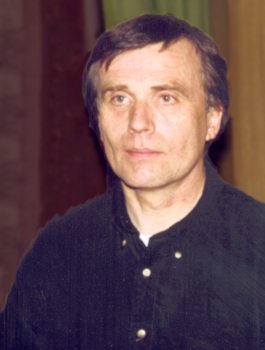
Nikolaeva and her two young sons are not evacuated in time and are trapped in their apartment, in a city that has just fallen to the invading Nazi armies. Nikolaeva's husband, a university professor and famous scientist before the war, is now a Commander in the Red Army. Although this fact already puts their lives in mortal danger, Nikolaeva gives haven to a woman being sought by the Nazis. This draws the attention of the Germans who come to interrogate her. One of them is an officer who had studied with her husband before the war. Miraculously avoiding arrest, Nikolaeva has to abandon the apartment and the city with her two sons.
When directors Andrei Dobrovol'skii and Georgii Dul'tsev were hired by Mosfilm Studio in 1985, they received a standard assignment: to make a series of short films in the Moscow Association of Young Filmmakers. Instead, they shot a number of episodes from a projected full-length feature film, and subsequently received permission to shoot the rest of the film, which became The Ford.
The Ford is almost unrelenting in its visualization of desire and despair. Most of the film is shot in deliberately stark tones (the present) or in heavily misted soft focus (the past). In either case, however, it is never possible to penetrate into the image: darkness and fog equally obstruct perception. The film's slow and measured editing pace gradually adds to the sense of oppression and hopelessness. Even when the camera briefly wanders outside the apartment, the film is ruled by its spacious claustrophobia.
The film is shot mostly in Nikolaeva's apartment, which seems to be a cross between a museum of the Stalin-era priviligentsia's comforts, on the one hand, and a bibliophile's library, complete with original drawings by Albrecht Dürer, on the other. The Ford's extensive use of Dürer's drawings is only one of the film's many allusions and homages to recently deceased director Andrei Tarkovskii (in this instance to Tarkovskii's own debut film, Ivan's Childhood, 1962). In fact, the film's release coincided with the explosion of the "cult of Tarkovskii'," which accompanied his official rehabilitation during perestroika.
Ironically, while perestroika (1986-1991) will be remembered in part for the work of the Disputes Commission of the Union of Filmmakers and Goskino in releasing more than a hundred films that had been "shelved" by the censors for more than decades, The Ford became a de facto "semi-shelved" film. Although it received an official release date, the virtual absence of commercial prints ensured that the film was screened very rarely and never reached a general audience.
According to lead actress Al'bina Matveeva, who introduced the film, this paradoxical situation was the direct consequence of actions by Vladimir Naumov, Dubrovol'skii's former teacher and head of the Association of Writers and Filmmakers at Mosfilm Studio. According to Matveeva, Naumov demanded a number of major changes in the finished film, most notably that the directors cut the scenes in which one of the boys draws red stars on the Dürer print of The Four Horsemen of the Apocalypse.

Andrei Dobrovol'skii was born in 1950. He completed his studies at the Moscow Institute for Aviation in 1973 and continued to teach there until 1980. In 1985 he graduated from the State Institute for Filmmaking (VGIK), where he studied in Aleksandr Alov's (until his death in 1983) and Vladimir Naumov's master classes for directors. He was hired as a director by Mosfilm Studio in 1985.
There is no biographical information currently available on Georgii Dul'tsev.
| 1982 | A Common Tub (course film, short) |
| 1983 | Transformation (co-directed with S. Davydova, course film, short) |
| 1985 | Our Commander [Kombat] (diploma film, short) |
| 1987 | The Ford (co-directed with Georgii Dul'tsev) |
| 1990 | The Sphinx (Grand Prize at the Sverdlovsk Film Festival) |
| 1992 | The Presence |
| 1997 | Passionate Cuisine (3 episodes, television) |
| 1997 | Paradzhanov's House (documentary) |
| 1998 | Five Evenings With BDT (documentary, 5 episodes, television) |
| 1987 | The Ford (co-directed with Andrei Dobrovol'skii) |
| 1991 | The Other Side |